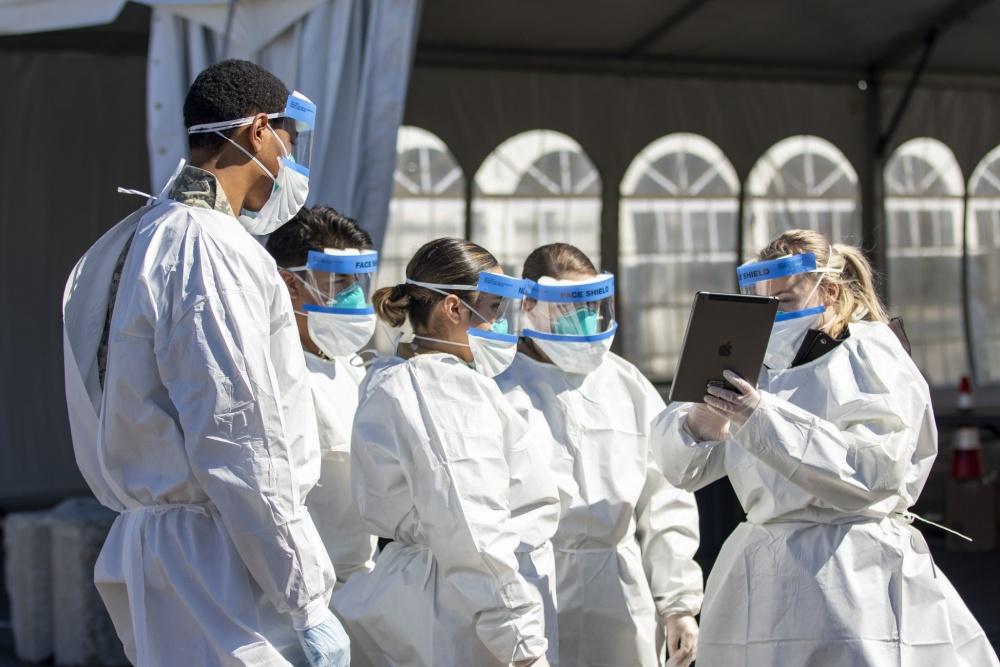Introducing coronavirus health response teams would save lives
Posted By Luke Gosling on March 24, 2020 @ 06:00

The coronavirus sweeping Australia and the rest of the world will reshape our ways of life for many months, if not years. It has already changed what we can do, who we can spend time with, and where we can and can’t go. It’s a scary time for many Australians, thousands of whom have already lost or will lose their jobs, and for the elderly and the ill, who are particularly vulnerable in the face of the virus.
But there are also stories of heroism in this crisis. It’s not all toilet-paper hoarders. A huge number of Aussies, like our volunteer firefighters only months ago, are carrying on at significant risk to themselves in our Coles, IGAs and Woollies, in trucks, hospitals, schools, restaurants and petrol stations. So-called ordinary people are making a big difference by doing their jobs regardless of fears they may have. They have families too. They should be treated with respect.
We need to channel this focus that gets so many of our workers to their shifts each day and night and direct it to driving down the infection curve. As the government continues to roll out measures to do this, it should urgently consider standing up coronavirus health response teams.
What’s crystal clear from the advice of healthcare workers is that as the situation continues to degrade in coming weeks and months, there will be an urgent need for supplementary, temporary, semi-trained health workers to save our healthcare system from reaching crisis point.
Health professionals I’ve consulted say that having assistants to help disinfect waiting rooms and treatment rooms between patients, as well as transport and advise patients on isolation, would help relieve some of the immense pressure they’re under. As the pandemic worsens, the need is only going to grow for such a mobile, semi-skilled workforce to provide basic support at the medical front line.
That needs to be done to help hospital workers, the first echelon, save lives. But how do we get there while mitigating the obvious health and safety risks? There are three options, though if conditions become critical, we may need to consider a mix of all three under separate or joint command.
Calling up the Australian Defence Force Reserves as the second echelon is an obvious step. Planning is well underway. The call-up of reservists in Operation Bushfire Assist is fresh in our memory. This recent deployment has put them in a good position to go again. In the UK, 20,000 troops have just been put on standby to help with the Covid-19 outbreak there. In the US, over 2,000 National Guard troops have been called up in similar roles to try to reduce a pandemic toll that could surpass the number of American personnel killed in both world wars.
Another option is to draw on our private and not-for-profit sectors. Professional training organisations could create a three- to five-day course covering risk management procedures, cleaning procedures, virology concepts, the use of personal protective equipment and a health system overview for response team members. I’m advised that setting up thousands of personnel reasonably quickly is achievable. Team Rubicon Australia is a model of a third-echelon organisation which recently applied the skills of 3,000 volunteers, most of them veterans, to support drought, flood and bushfire victims.
A third option is to go directly to the people, especially those who have no work or who have been made redundant due to the bushfire or coronavirus crisis, be they in the retail, airline, restaurant or tourism industries. The Queensland government has started to call for expressions of interest from the public to help. Under this model, a decentralised army of thousands of volunteers with very useful soft skills could be assembled from those fit and keen to help.
There are also many casual workers and out-of-work sole traders like tour guides and adventure leaders who would make a big difference. They could be quickly trained and organised into health emergency assistance and response teams. These volunteers and the supporting training organisations and businesses would require funding in the form of a stimulus measure.
There are costs and benefits with each option. The biggest risk across all options is that insufficient training and leadership leads to volunteers doing more harm than good by inadvertently contracting and spreading the virus themselves. The history of medicine is full of examples of well-intended interventions spreading disease. That’s why there must be strict professional standards.
But doing nothing except calling out the reserves also presents an unacceptably high risk. As we saw in the bushfires and earlier disasters, Australians are already volunteering without direction from government. Some 11,000 people have joined a Facebook group to support healthcare workers. Another 1,000 are helping the elderly in Perth. Many groups have spontaneously sprung up to deliver food and are doing their civic duty unasked. They are an example to all of us.
But the brave Australians volunteering their time and money to help their neighbours will face an escalating risk of contracting or spreading the virus. Since it’s predictable, governments have a duty of care to intervene and mitigate this threat. The federal government can reduce the risk by funding health response teams and paying for their training and time.
As push comes to shove, I have no doubt we’ll all come together, as Australians do in times of trial. But we need a framework in which everyone in society is informed and playing their part. We also need real leadership that harnesses the immense talents and resources of the Australian people to support the health and wellbeing of our society and the recovery of our economy.
Article printed from The Strategist: https://aspistrategist.ru
URL to article: /introducing-coronavirus-health-response-teams-would-save-lives/
Click here to print.